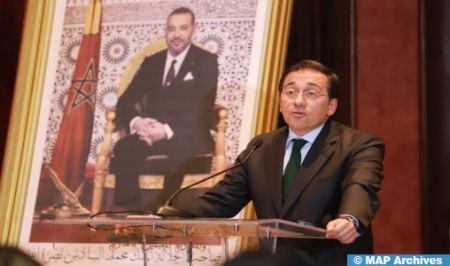Morocco-Spain Partnership: Four Questions to Spanish Foreign Affairs Minister, José Manuel Albares
In an exclusive interview with MAP, Spain’s Minister of Foreign Affairs, European Union, and Cooperation, José Manuel Albares, currently on a visit to Morocco spanning Wednesday and Thursday, highlighted the “multidimensional” nature of the partnership between his country and Morocco. Spain’s top diplomat gave a “very positive assessment” of the Roadmap adopted by both nations in April 2022. This initiative took place during the visit of the Spanish Government President, Pedro Sanchez, to Morocco, upon the invitation of HM King Mohammed VI. 1. You have chosen Morocco for your first bilateral trip abroad since the start of this new legislature. What is the significance of this visit and what is its main objective? This is indeed my first official bilateral trip in this new phase of the Spanish government. It’s a great pleasure to be in Morocco. We’re going to relaunch the agenda or roadmap we’ve built, which is multidimensional. We are setting an example in the fight against human trafficking mafias and in the fight against terrorism. Our trade has literally soared. But most importantly, we have strengthened our political and human relations more than ever before. For me, these are the foundations on which we are building this relationship of strategic partnership today. 2. Almost 18 months after the Joint Declaration of April 2022, how would you assess the results of this new roadmap? The outcome of the roadmap is obviously very positive. We have strengthened our strategic partnership. Friendly relations between our two countries have reached an all-time high, which is reflected in a number of ways. On the economic front, trade between the two countries has reached 20 billion euros. Spain is Morocco’s leading customer and supplier, while the Kingdom is Spain’s third-largest trading partner outside the EU, surpassed only by the United States and the United Kingdom. Trade has risen by 40% compared to the period before the roadmap was adopted in April 2022, and the figures for this coming year will be even higher. The second aspect concerns security and judicial cooperation to combat mafias involved in human trafficking and terrorism, which sets an example for the whole world and which has also been consolidated by this new roadmap. Thirdly, the human ties between the two countries have been strengthened. It should not be forgotten that over a million Moroccans live in perfect integration in our country, contributing to Spain’s prosperity. There are also more than 20,000 Spanish citizens who are well established in Morocco. These citizens, on both sides, are the true ambassadors of Morocco in Spain and of Spain in Morocco. 3. On the basis of the results you mentioned earlier, do you think that the partnership between Morocco and Spain has reached the level of a multidimensional partnership? Absolutely. The strategic partnership between the two countries is now multidimensional, because it encompasses all areas. First and foremost, this partnership is reflected in the trust we place in each other as strategic partners with very high-level political relations and human relations that are becoming increasingly close. These fundamentals have made the relationship between Morocco and Spain one of the closest and richest in the world. Morocco is Spain’s top foreign policy priority. With Morocco, we truly have a partnership of choice, a win-win partnership. Everything we do together benefits both countries. 4. Do you think that the co-hosting of the 2030 World Cup by Morocco, Spain and Portugal will further support this partnership? The co-hosting of the 2030 World Cup by Morocco, Spain and our Portuguese friends will surely be one of the keystones of the roadmap launched almost two years ago. The whole world, which follows football, will see first-hand the Spanish-Moroccan friendship, the partnership between our two countries, but also the partnership between Europe and Africa, given that Morocco is the gateway to the African continent and Spain is the gateway to Europe. For the first time, the world will be watching a World Cup organized on two continents. Through this event, the two countries will demonstrate their joint capacity to organize and celebrate the values of sport, namely competitiveness and effort, as well as diversity and plurality.

